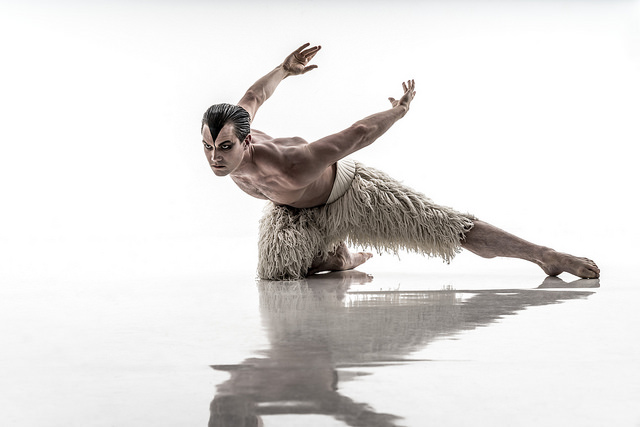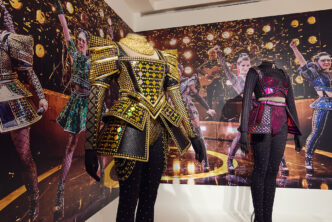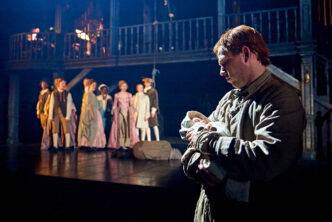Choreographer, Matthew Bourne talks to Quays Life about re-staging his ground-breaking Swan Lake for the 21st century and the royal scandal that inspired him to transform this Tchaikovsky classic with a multi-award winning, male corps-de-ballet.
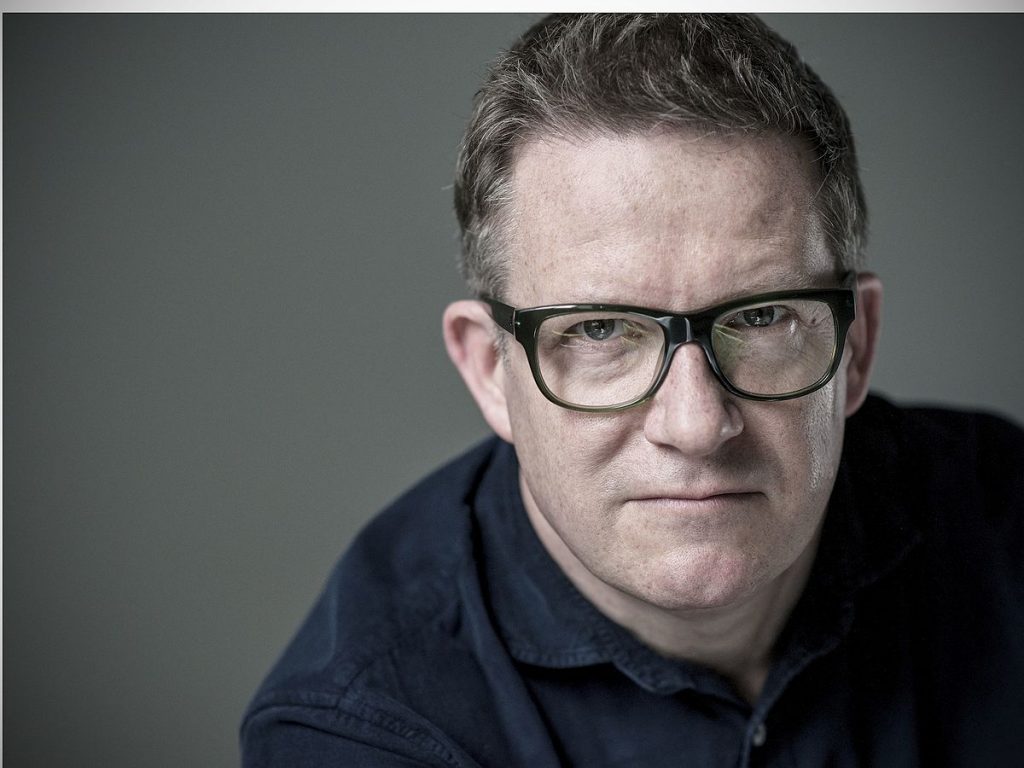
You first staged Swan Lake in 1995, and it went on to become the longest running ballet on the West End and Broadway. It is still now, perhaps your best-known and best-loved of work. With all of its success and rich history, how do you feel about the prospect of bringing it back to UK audiences for the upcoming 2018/19 tour?
It’s always exciting to bring back Swan Lake. So many people love it, and you know they’re going to want to come and see it again and bring friends and family to watch it who didn’t see it last time. That is the growth of the show over the years I think – the fact that people want other people to come and see it.
There’s also a whole new generation of young people who won’t have seen it. We know, even from discussions with the cast we have at the moment, how inspiring this piece can be for young people who see the piece and then want to go on to a career in theatre, or particularly dance. Many of the men in the show, and in fact the women too, first came to dance through this piece having been taken to see it by their parents, or perhaps by their dance school, and now they’re in it themselves.
It still seems to move and inspire people and therefore we get excited about doing it because that’s what we’re here for. We’re here to entertain.
The new staging of the show is being presented as having a fresh look for the 21st century. Why did you decide to re-stage the show now; and as the show has been seen by millions of people worldwide over the years is it a bigger challenge to revisit this work than other shows in your repertoire because audiences are so passionate about it and know it so well?
It’s an interesting point about changing a piece that is so well-known and so well-loved. We’ve made these changes for several reasons – one being that it’s been around for 23 years now since we first made the piece, and Lez Brotherston (Set & Costume Design) and I felt it was a great opportunity to refresh it. I wouldn’t say we’re changing it enormously but refreshing it for this next period of time. It may change again in the future, who knows, but I think whilst we’re still excited about the piece and we feel we’ve got this opportunity, so it seems a great chance to do it.
Everything we’ve done to the piece has been mindful of the fact that people already love the piece – and that’s not different from many other projects that I’ve taken on actually.
For many people seeing the new version of Swan Lake they probably won’t recognise many of the changes we’ve made, and I think they will feel they are still seeing the same piece. We will know however, that we’ve made hundreds of little changes. It won’t be such big changes that people will think ‘oh what did you do that for?’ or ‘why did you lose that great idea?’. Maybe there will be one or two things that big fans of the show will miss, but I think generally speaking we’re celebrating the piece that already exists.
We have a new lighting designer, Paule Constable, as one of our associates for the piece. Paule has never seen our Swan Lake before – not on film or on stage – so we’ll get a completely fresh approach from Paule and I don’t know what it will look like yet. It’s definitely going to look different, as Paule’s a different kind of designer, so that will be a big change.
We’ve got a completely new cast as well. There are lots of new dancers who will bring their own interpretations to the piece, as they do with all our shows and that keeps the pieces fresh and alive.
I certainly don’t think audiences who already love the piece will be in any way disappointed.
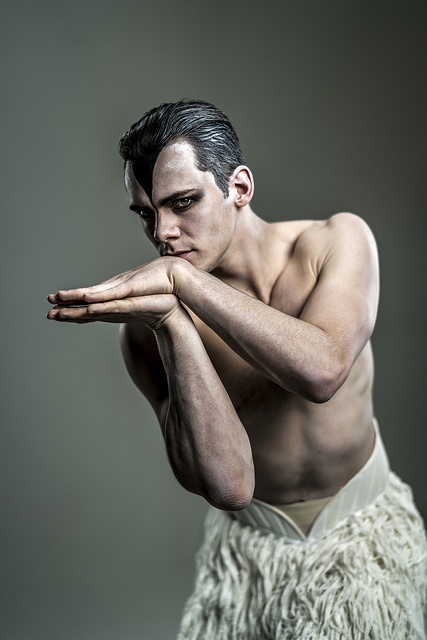
Adam Cooper played the original Swan/Stranger. His performance, perhaps more than any other within the last quarter of a century, seems to have instigated a huge rise in the number of boys and young men wanting to pursue dance as a career; and of course, this was reflected in the film, Billy Elliot. Will Bozier, who will be playing the Swan/Stranger in the new production himself credits Adam’s performance as being his inspiration to become a professional dancer. Were you surprised by the scale of the impact Swan Lake had on young dancers?
Obviously when we made Swan Lake we didn’t know that it would have the impact it’s had, but over the years I’ve come to realise that it’s been the trigger for a lot of boys and young men going into dance.
I think it felt like something very cool and very masculine, yet it required a lot of artistry and sensitivity, so it was that mixture of things, I think, that really inspired a lot of young men to want to get into dance and to want to be a Swan, which is borne out by every member of our cast virtually who grew up with this piece.
I find that a lovely aspect of the show now, as it’s so meaningful for the people in it. They really want to be in it and it’s their ambition to be in it. There aren’t many shows where you can you say that you’ve got an entire cast of people whose burning ambition it is to be in the piece, so you get a wonderful connection with the dancers and a wonderful sense of community.
You took Swan Lake in a completely different direction from the versions that had gone before it. What motivated and inspired you to do that; and why was it important to you to set this classical ballet in a more contemporary world and to invite people to view it from an alternative perspective?
Well, I didn’t see any point in creating a Swan Lake that was similar to any of the others that were around, because there were certainly a lot of those! Mostly they were classical versions – all a bit different but all telling a similar story – and so this version had to be different.
We’re not a classical company and we don’t dance ‘en pointe’ usually (well, we have from time to time since then, for example with The Red Shoes, but it certainly wasn’t something we were doing back then.)
We’re a contemporary dance theatre company, so we had to tell a story through movement, in a different way, and it needed a big idea to make people see it in a different way as well.
So, the male swans were the big idea and a secondary big idea was modern Royal scandal. This was in the news all the time whilst we were making the piece, with Diana and Charles, and Sarah Ferguson, and Camilla Parker-Bowles, and Princess Margaret. All of these stories were daily news during the making of the show. And so, it was very topical thing to have a Prince who couldn’t be the person he really was, or to be with the person he wanted to be with – all very relevant to contemporary Britain and contemporary Royalty. So, we’re still telling the same story – it’s still about a Royal family, but a modern Royal family.
I thought that would be picked up on quite a lot when the show first was first seen, but actually the attention was much more on the use of the male swans. It was such an iconic image for people to have a male dancing swan. It was very unexpected, and people couldn’t imagine it what it was going to look like. They all thought it was going to be a send-up and that it was going to be a humorous piece. There is a bit of humour in it but the main bulk of it isn’t. We needed an idea that could wipe away everyone’s existing memories and images in their heads of the piece, as they had perhaps seen it before in other versions, and the swans did that very well.
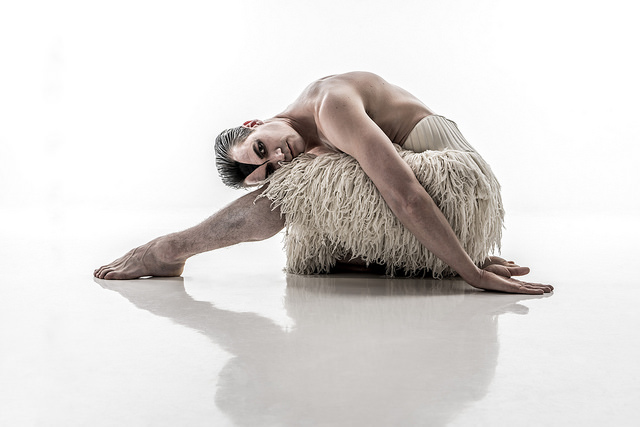
You list Alfred Hitchcock’s film from 1963, ‘The Birds’, as one of your inspirations for the staging and choreography of the show. Can you tell us a little bit about that?
Our production of Swan Lake is not a piece that has an enormous number of movies that are obviously attached to it, like some of our pieces do. This inspiration is much more coming from the classical ballet and the story that that tells and using those formalities sometimes in the way we tell our story and the structure of it. It is, as I’ve said, also about modern Royalty and the Royal family.
There’s also lots of little filmic things and characters that creep into it, as always, because my head is full of those images. However, the one piece, that people are usually surprised by initially and then they go, ‘oh yes of course!’ is the inspiration that has come from Alfred Hitchcock’s film, The Birds.
If people know this movie there’s an amazing scene where the main character, played by Tippi Hedren, is sitting on a park bench powdering her nose, and there’s a children’s playground with climbing frame in it behind her; and one bird swoops down onto it and she looks around and notices the bird. And then, the next time she lifts her compact mirror there’s a reflection in it and we see it’s now absolutely full of birds and they’re all waiting to fly at her.
We do this with the Swans on the bed and that’s a direct quote from The Birds. It’s the only story really where birds take over and attack the humans. It’s an extraordinary story that’s never explained and I think that’s rather good too; the fact that it just happens!
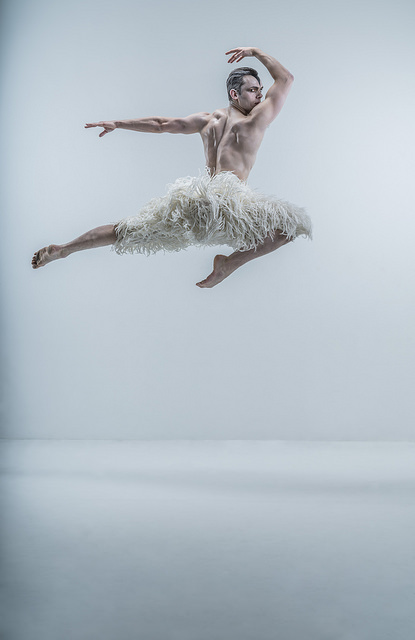
Could you tell us what you feel are the key themes of your version of Swan Lake; and what if anything is the most important message that you hoped to portray to the audience?
I don’t like to dictate too much to people because I feel people do see the piece in different ways, but for me ultimately it is about someone struggling with who they are and the world they are in – albeit quite an extraordinary world for how many people are Royal?! But even so, we can relate to that. We can all relate to an individual who in the society that they are in can’t really be who they really are.
I think the piece moves people because it has a message about looking for acceptance; but it also moves people because it’s about loss as well, and it’s about people that you’ve lost.
I feel those themes are very universal and very much things that touch all of us. It’s a very human piece and global – both in its message and in the way that it brings us all together.
I think it’s underestimated sometimes how far we’ve moved on with this piece in the time it’s been on. When we first started to do it, we had audiences walking out when the Prince and the Swan started dancing together. We had little girls in tears that it wasn’t performed with the tutus and pointe shoes, and things like that, that they were expecting. We also had a slightly aggressive attitude towards it from some members of the audience; and some people refused to come and see it at all.
It got dubbed ‘the gay Swan Lake’, which was not what the aim was, but it certainly was a story within it that was very meaningful for gay audiences, and I celebrate that. I did then, and I do now. It is a bit more wide-ranging than that too however, and it can really be interpreted in many ways.
It’s accepted now by a much wider audience who come to see the show and rather than be shocked any element of it, I think they find it uplifting that this is a story being told about a young man who is confused about his future and about his sexuality. I think that’s something that is very meaningful for young people in the audience as well.
Swan Lake is at The Lowry Theatre, Salford Quays from 20 November to 1 December 2018. Visit website for full tour details. Read our review at The Lowry.

